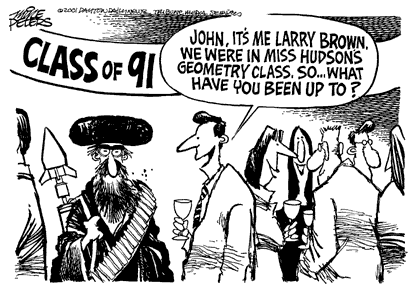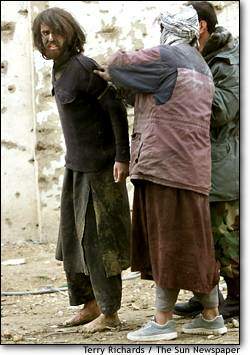
Many are wondering: Why Virginia? Why not for example New York where the attack on the World Trade Center took place? Why not in California, where Walker lived before going to Pakistan and Afghanistan? Why not in Washington DC?
Everybody familiar with the justice system in Virginia knows the answer. In Virginia, defendants are routinely denied the most fundamental and basic rights to defense. In Virginia, if the state is sufficiently determined, anybody can be convicted of anything. You can be convicted of murdering my long deceased grandmother. Evidence deemed inadmissible by any other court in the United States is allowed in Virginia. There is no constitutional right to a fact hearing before being indicted by a grand jury. Defendants are not allowed to know what they are accused of doing until the trial is underway, by which time there is no opportunity to offer a refutation.
 |
There is also Virginia's notorious 21-day rule, which states that more 21 days after conviction, no new evidence may be introduced to show that the defendant was not guilty. This means that for example if a man has been convicted of murder and is on death row and more than 21 days have passed, and the murder victim shows up alive and perfectly healthy, having been away on vacation in Hawaii, the murder conviction will still stand and the defendant will still die in the electric chair. Many men have died in the electric chair in Virginia, even though having proof positive that they were not guilty and having been denied a hearing at which they could have proven their innocence.
The case of John Walker will be tried in the federal courts, not in the state courts. However, there is a long established rule that the federal courts will adopt the procedures followed by the state courts in the jurisdiction where the case is tried. Also, Virginia is in the Fourth Circuit and the Fourth Circuit is notorious for giving defendants No Chinaman's Chance. J. Harvie Wilkinson III, the Chief Judge of the United States Court of Appeals for the Fourth Circuit, is the second most notorious hanging judge in the entire judicial system. The most notorious is Harry L. Carrico, the Chief Judge of the Supreme Court of Virginia.
 |
The United States Constitution guarantees the right to an Indictment by a Grand Jury. One purpose of this indictment is to notify the defendant of what he is accused of doing and to give him the opportunity to testify and to offer his defenses. However, in Virginia, there is no Grand Jury testimony by live witnesses. The only witness will be a police officer who will usually have no personal familiarity with the case but who will simply read off the charges. The Grand Jury is not allowed to call witnesses. The defendant is not allowed to appear or to testify. Typically, there is an indictment day and the police officer simply reads off a list of cases and the charges. In a typical day, the Grand Jury will return a "true bill" of indictment on more than 100 cases in the space of only two hours. It virtually never happens that the grand jury does not return a true bill of indictment.
There is no discovery in criminal cases.
Although there can be a preliminary hearing at which witnesses will testify, this is at the option of the prosecution. The defense has no say. The prosecution will waive the preliminary hearing and go straight for an indictment, if it wants to be certain of winning a conviction. Even if the judge dismisses the case after a preliminary hearing, the prosecution can go for an indictment anyway.
At trial, the defendant is not allowed to offer most defenses. For example, he is not allowed to offer evidence casting doubt on the credibility of the witnesses for the prosecution. In the highly publicized Marv Albert trial for example, there was a defense witnesses who was going to testify that the complaining witness has offered him a $50,000 bribe to lie on the witness stand. This $50,000 was to come from the book deal the complaining witness was going to get if Marv Albert was found guilty. The judge would not allow this testimony to be presented to the jury. Defense counsel, who was from out-of-state, repeatedly complained that he was not being allowed to present and offer his defenses. Finally, Albert was forced to plead guilty as part of a deal or otherwise face a virtual certainly of 20 years in prison, because the jury had not been allowed to hear any of his defenses.
The defendant is not allowed to participate in his own defense. If he sees that his defense counsel is not doing a good job, he cannot fire him. If he realizes that a witness testifying against him is lying, he cannot order his counsel to ask questions.
 |
The defendant is not allowed to speak and has no rights. There have been cases where the defendant is a lawyer and yet could not require his own counsel to offer a defense.
On appeal, the lawyer handling the appeal will be the same lawyer who appeared at trial. He generally cannot be relieved. This means that if the trial lawyer did not do a good job, the appellate court will not hear about it, because a lawyer will always defend his own work.
On appeal, most grounds which are accepted by other courts are not accepted by the Virginia courts. For example, the ground of "inadequate representation by counsel", which is a standard ground for appeal in other courts, is not allowed in the Virginia courts.
The ground of "inadequate representation by counsel" is allowed in habeas corpus proceedings in Virginia, but this is meaningless because the last time that a defendant won on this ground in Virginia was in 1966, which is 36 years ago.
Federal habeas corpus is not allowed in Virginia unless the defendant has "exhausted remedies". However, remedies are inexhaustible because there is always some kind of petition that the defendant could file. Moreover, defendants are allowed only one shot at filing a habeas corpus petition. If the court rules that there has been a "procedural default" or that the defendant "failed to exhaust his remedies", the defendant will not be allowed to file a subsequent habeas corpus proceeding even after the defect has been cured.
The United States Supreme Court has recognized that the Virginia Courts give the defendant no chance to win. The US Supreme Court overturned two Virginia death sentences in year 2000.
During oral argument in Williams vs. Taylor, Justice Ruth Bader Ginburg asked, "Haven't you created a standard which makes it impossible for the defendant to win?"
The defendants died in the electric chair anyway. Virginia re-instated the death sentences after the US Supreme Court had overturned them.
The case against John Walker is weak. There are no witnesses except witnesses who saw him crawl out of a hole in the ground. It is not illegal to crawl out of a hole in the ground. Almost everybody else involved with him in Afghanistan is now dead. This proves that Walker was merely trying to save his own life. He certainly had no involvement in the attack on the World Trade Center or on the Pentagon. The jurisdiction of Virginia is unclear.
In any other state, the charges against John Walker would never stand up in court and would be thrown out summarily. However, Walker will be tried in Virginia, a state that does not allow a defendant to offer his defenses.
Sam Sloan
PS I am now a candidate for election for the New York State Assembly from the 56th District in Brooklyn. The election will be held on February 12.